Beautifully Crafted Impactful Graduate School Reference Letters: 18 Templates to Guide You
Welcome to “Graduate School Reference Letters“ your trusted resource for all things related to Graduate School Reference Letters. We understand that the graduate school application process can be daunting, and reference letters play a critical role in showcasing your qualifications and potential. Whether you are an applicant seeking guidance on how to request strong reference letters or a letter writer looking for tips to craft compelling endorsements, you’ve come to the right place. Our website is designed to provide you with comprehensive information, expert advice, and personalized services to help you navigate the reference letter journey with confidence. We are here to support you in presenting your qualifications effectively and maximizing your chances of securing admission to your desired graduate programs. Explore our resources, engage with our tips and guidelines, and discover how our customized reference letter services can elevate your application. Welcome to our Graduate School Reference Letters website, where we are dedicated to helping you succeed in your academic pursuits.
Tips for Writing Effective Reference Letters
- Familiarize Yourself with the Program: Take the time to understand the specific requirements and expectations of the graduate program the applicant is applying to. This will help you tailor the reference letter accordingly and highlight relevant skills and experiences.
- Focus on Key Strengths: Identify the applicant’s key strengths and qualities that make them a strong candidate for the program. Highlight their academic achievements, research abilities, leadership skills, or any other notable attributes that align with the program’s goals and requirements.
- Provide Specific Examples: Support your claims about the applicant’s strengths with specific examples or anecdotes. Describe instances where you observed the applicant demonstrating their skills, achievements, or character traits. This adds credibility and makes the reference letter more compelling.
- Structure the Letter Professionally: Use a professional tone and adhere to a clear and organized structure. Begin with an introduction that establishes your relationship with the applicant, followed by paragraphs that discuss different aspects of their qualifications, and conclude with a summary or closing statement.
- Be Honest and Objective: While it’s important to highlight the applicant’s strengths, it’s equally important to provide an honest and objective assessment. Avoid exaggeration or embellishment, as it may undermine the credibility of the letter. Balance your praise with constructive feedback, if applicable.
- Tailor the Letter to the Program: Customize the reference letter to align with the specific requirements and focus of the graduate program. Highlight how the applicant’s skills, experiences, and goals align with what the program seeks in its candidates.
Importance of Reference Letters in Graduate School Applications
Reference letters play a vital role in the graduate school application process, providing valuable insights into an applicant’s abilities, achievements, and potential for success in graduate studies. Here are some key reasons why reference letters are important:
- Objective Evaluation: Reference letters offer an objective evaluation of an applicant’s qualifications from individuals who have observed their academic performance, research abilities, or professional experiences. Admissions committees rely on these letters to gain a well-rounded perspective on the applicant beyond their self-presentation in the application materials.
- Validation of Qualifications: Reference letters serve as a validation of the applicant’s qualifications and achievements. They provide evidence that the applicant possesses the necessary skills, knowledge, and attributes required for successful graduate-level studies. A strong reference letter can effectively support the applicant’s claims and enhance their credibility.
- Comprehensive Insight: Reference letters provide a comprehensive insight into the applicant’s abilities, character, and potential for growth. They go beyond what can be conveyed through grades or test scores, offering a more holistic view of the applicant’s intellectual curiosity, work ethic, interpersonal skills, and leadership potential.
- Comparative Assessment: Admissions committees often receive numerous applications from highly qualified candidates. Reference letters enable committee members to make comparative assessments by highlighting the applicant’s strengths and unique qualities in relation to other candidates. They help differentiate exceptional candidates from the rest of the applicant pool.
- Contextual Information: Reference letters provide contextual information about the applicant’s background, experiences, and achievements. They offer a narrative that sheds light on the applicant’s personal and academic journey, explaining any challenges faced, growth demonstrated, or contributions made within a particular context. This contextual information can greatly influence the committee’s perception of the applicant.
- Professional Recommendations: The expertise and reputation of the individuals writing the reference letters can significantly impact the evaluation of the applicant. Letters from professors, research supervisors, or professionals in the field carry weight and can provide valuable endorsements of the applicant’s readiness for graduate studies or specific research areas.
- Assessing Fit with the Program: Reference letters help admissions committees assess the applicant’s fit with the graduate program. They enable committee members to evaluate whether the applicant’s goals, interests, and potential align with the program’s objectives and academic environment. A strong reference letter can convincingly demonstrate how the applicant’s background and aspirations align with the program’s offerings.
#1: Outstanding Academic Achievements
The purpose of this Academic Excellence Reference Letter is to highlight the outstanding academic achievements of the student and provide a comprehensive assessment of their intellectual capabilities, dedication, and commitment to excellence. This letter serves as a strong endorsement of the student’s academic performance and potential, aiming to support their application to graduate school or other academic programs. It showcases their exemplary academic record, rigorous coursework, notable accomplishments, and any distinctive qualities or strengths that set them apart as an exceptional candidate. The Academic Excellence Reference Letter aims to provide a holistic perspective on the student’s academic abilities, attesting to their intellectual prowess, discipline, and passion for learning.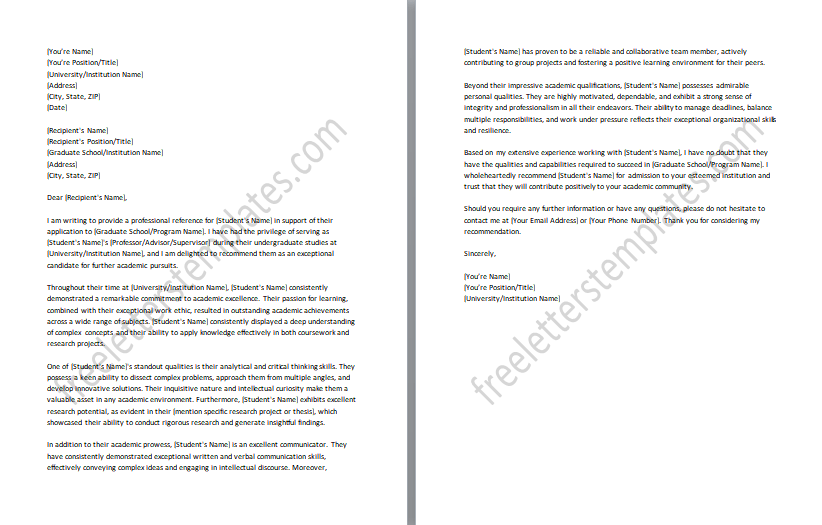
#2: Research Potential and Excellence
The purpose of this Research Potential and Excellence Reference Letter is to emphasize the student’s exceptional research abilities and potential, highlighting their passion for inquiry, critical thinking skills, and commitment to advancing knowledge in their field. This letter serves as a testament to the student’s ability to design and conduct rigorous research, contribute original ideas, and make significant intellectual contributions. The Research Potential and Excellence Reference Letter aim to provide a compelling endorsement of the student’s research capabilities, demonstrating their readiness to undertake advanced research studies at the graduate level and their potential to make meaningful contributions to their chosen field of study.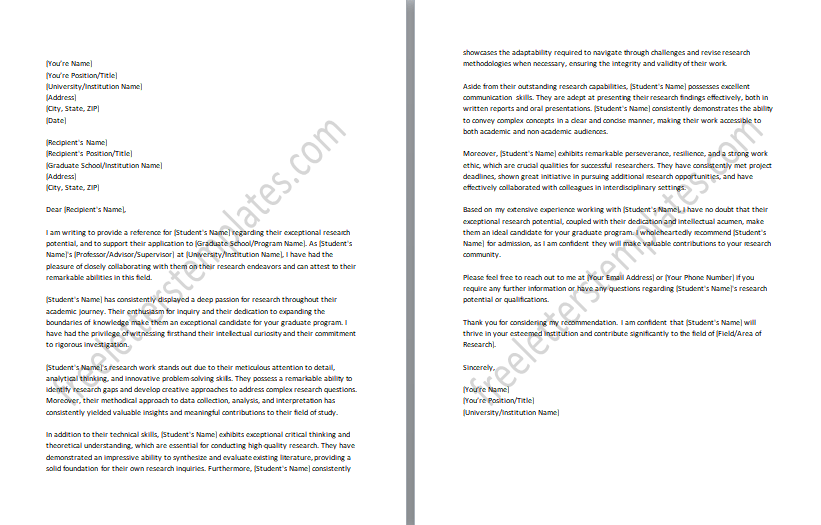
#3: Professional Competence and Skills
The purpose of this Professional Competence Reference Letter is to highlight the student’s exceptional professional competence and qualifications, endorsing their skills, knowledge, and experience in their chosen field. It showcases their practical skills, theoretical understanding, and relevant experience gained through internships, research projects, or other professional engagements. The Professional Competence Reference Letter emphasizes the student’s ability to apply their knowledge effectively, adapt to professional environments, work collaboratively, and demonstrate leadership qualities. It serves as a strong endorsement of the student’s readiness to excel in their chosen profession and supports their application to graduate school or other professional development opportunities.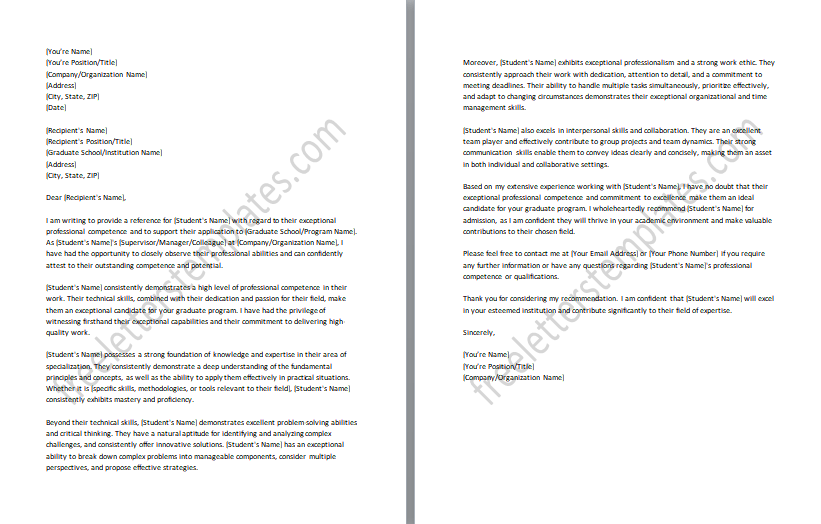
#4: Leadership and Community Impact
The purpose of this Leadership and Community Impact Reference Letter is to highlight the student’s exceptional leadership qualities and their positive impact on the community. It showcases their active involvement in extracurricular activities, volunteer work, or leadership positions, where they have demonstrated their capacity to initiate and lead meaningful projects that have had a lasting impact. The Leadership and Community Impact Reference Letter emphasizes the student’s ability to collaborate, communicate effectively, and motivate others toward a shared vision. It serves as a strong endorsement of the student’s leadership potential, highlighting their dedication to community service, and supports their application to graduate school or other leadership-oriented opportunities.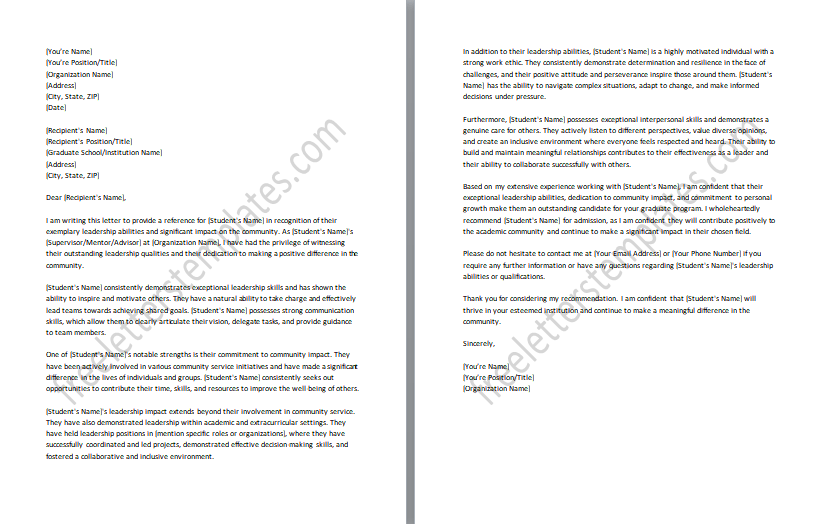
#5: Personal Character and Integrity
The purpose of this Personal Character Reference Letter is to provide insight into the student’s personal character, values, and integrity. This letter aims to provide a comprehensive assessment of the student’s moral compass, interpersonal skills, and overall character traits. It showcases their honesty, reliability, empathy, and respect for others. The Personal Character Reference Letter highlights the student’s ability to work well with diverse individuals, handle challenging situations with maturity, and demonstrate strong ethical principles. The letter supports their application to graduate school or other opportunities where personal character is valued.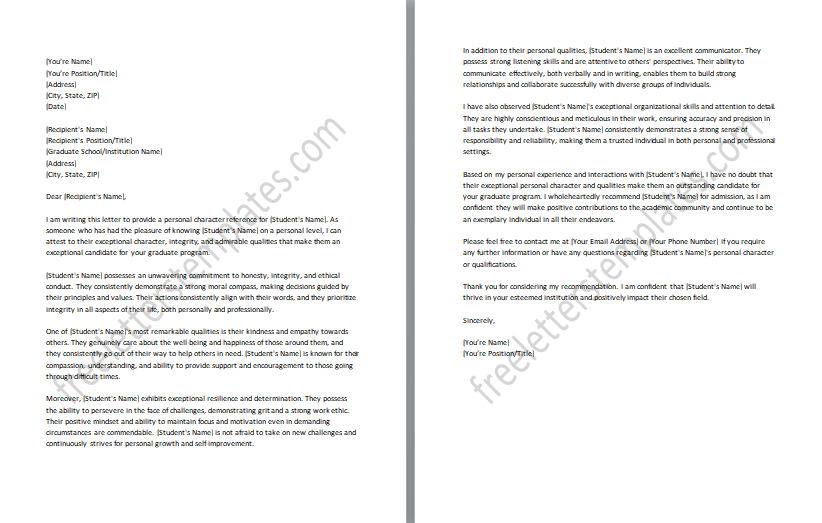
#6: Teaching Abilities and Pedagogical Skills
The purpose of this Teaching Aptitude Reference Letter is to shed light on the student’s innate talent and passion for teaching, highlighting their exceptional ability to connect with students and create a nurturing learning environment. This letter provides an in-depth assessment of the student’s teaching aptitude, showcasing their natural ability to explain complex concepts in a way that resonates with diverse learners. It emphasizes their enthusiasm for education, their commitment to adapting teaching methods to suit individual learning styles, and their unwavering dedication to continuously enhancing their teaching practices.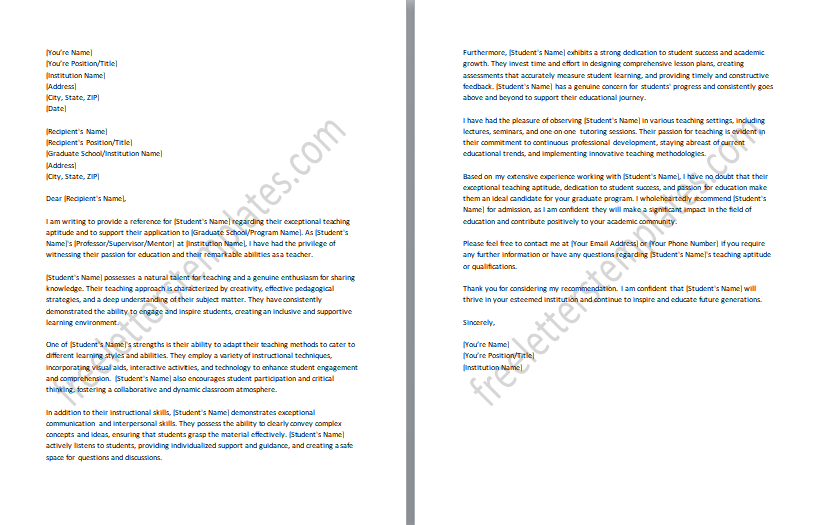
#7: Dedication to Volunteerism and Service
The purpose of this Volunteerism and Service Reference Letter is to highlight the student’s exceptional commitment to community service and their significant contributions as a volunteer. It showcases their passion for social causes, their ability to collaborate with diverse groups, and their strong leadership skills within volunteer organizations. The Volunteerism and Service Reference Letter serves as a testament to the student’s compassion, empathy, and unwavering commitment to creating a better world through service. It supports their application to graduate school or other opportunities where their commitment to community engagement and social responsibility are valued.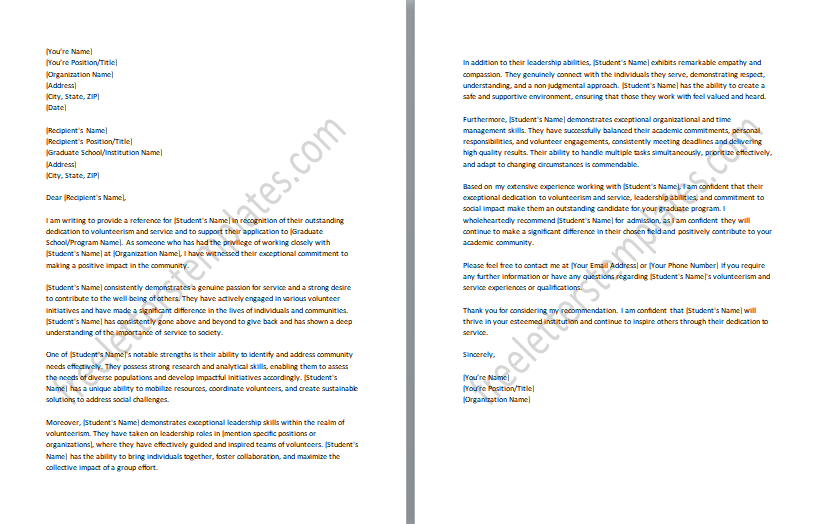
#8: Commitment to Diversity and Inclusion
The purpose of this Diversity and Inclusion Reference Letter is to highlight the student’s exceptional commitment to promoting diversity, equity, and inclusion. This letter showcases their efforts to create an inclusive environment, advocate for underrepresented groups, and foster a diverse community. It emphasizes their understanding of diversity’s importance, ability to collaborate across cultures, and dedication to challenging biases. The letter supports their application to graduate school or other opportunities valuing diversity and inclusion.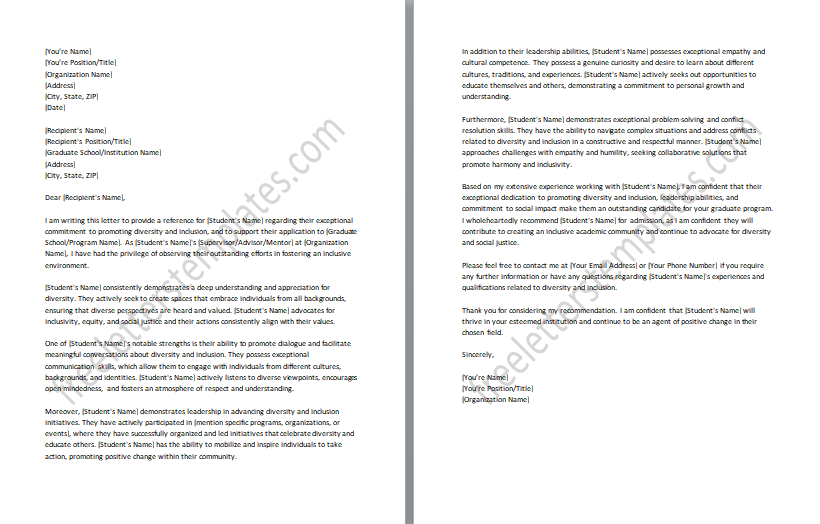
#9: Global Perspective and International Experience
The purpose of this International Experience Reference Letter is to showcase the student’s exceptional international experience and the valuable skills they have acquired through their global engagement. This letter highlights their cross-cultural competencies, adaptability, and ability to thrive in diverse environments. It emphasizes their exposure to different perspectives, their ability to navigate cultural nuances, and their capacity to effectively communicate across borders. The International Experience Reference Letter serves as a strong endorsement of the student’s global mindset and supports their application to graduate school or other opportunities where international experience is valued.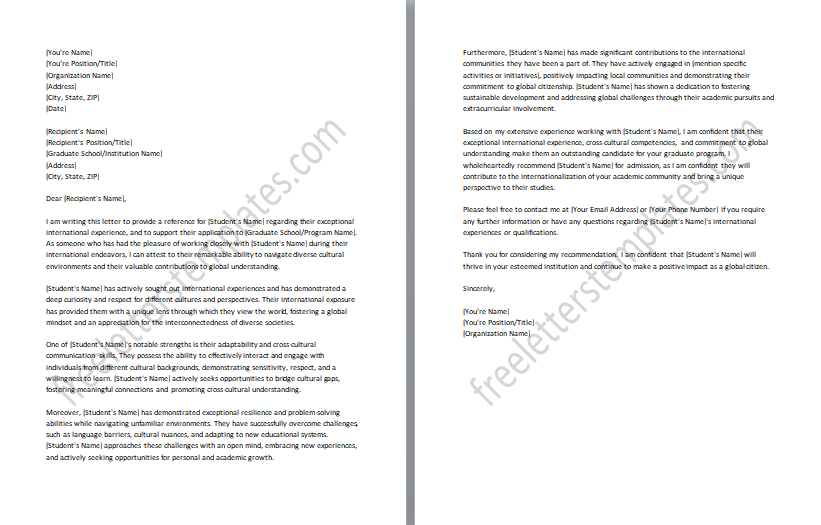
#10: Effective Teamwork and Collaboration
The purpose of this Teamwork and Collaboration Reference Letter is to highlight the student’s exceptional ability to work effectively in teams and collaborate with others. This letter showcases their strong interpersonal skills, their capacity to communicate and cooperate with diverse individuals, and their dedication to achieving common goals. It emphasizes their ability to listen actively, contribute meaningfully, and foster a positive team dynamic. The Teamwork and Collaboration Reference Letter serves as a strong endorsement of the student’s teamwork skills and supports their application to graduate school or other opportunities where collaborative work is essential.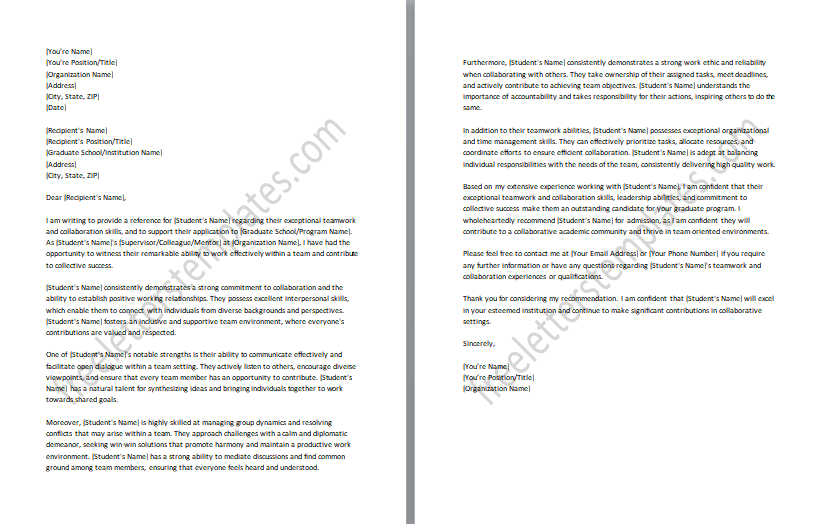
#11: Analytical Problem-Solving and Critical Thinking
The purpose of this Problem-Solving and Analytical Skills Reference Letter is to highlight the student’s exceptional ability to approach complex challenges, analyze problems, and propose effective solutions. This letter showcases their strong analytical thinking, their capacity to think critically, and their dedication to finding innovative solutions. It emphasizes their ability to break down complex issues, conduct thorough research, and apply logical reasoning to arrive at well-informed conclusions.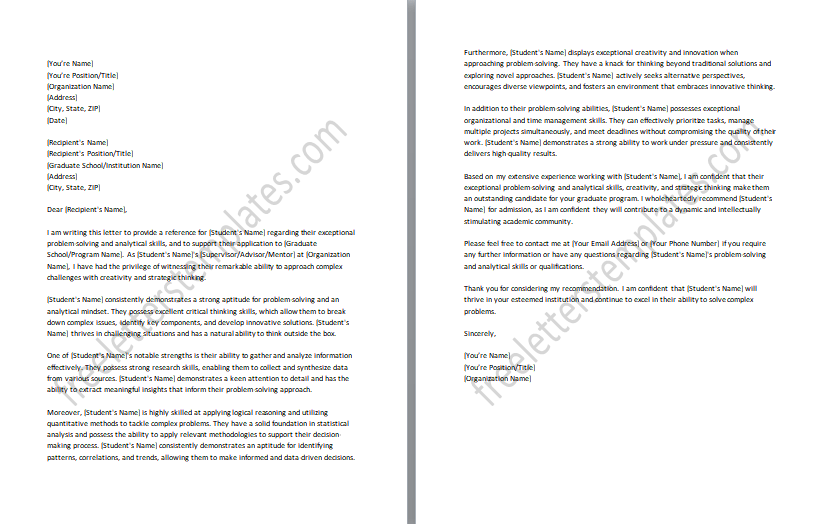
#12: Exceptional Communication Skills
The purpose of this Effective Communication Reference Letter is to highlight the student’s exceptional communication skills and their ability to convey ideas clearly and persuasively. This letter showcases their proficiency in written and verbal communication, their capacity to engage and connect with diverse audiences, and their dedication to effective interpersonal communication. It emphasizes their ability to articulate complex concepts, actively listen, and adapt their communication style to different contexts. The Effective Communication Reference Letter serves as a strong endorsement of the student’s communication abilities and supports their application to graduate school or other opportunities where effective communication is crucial.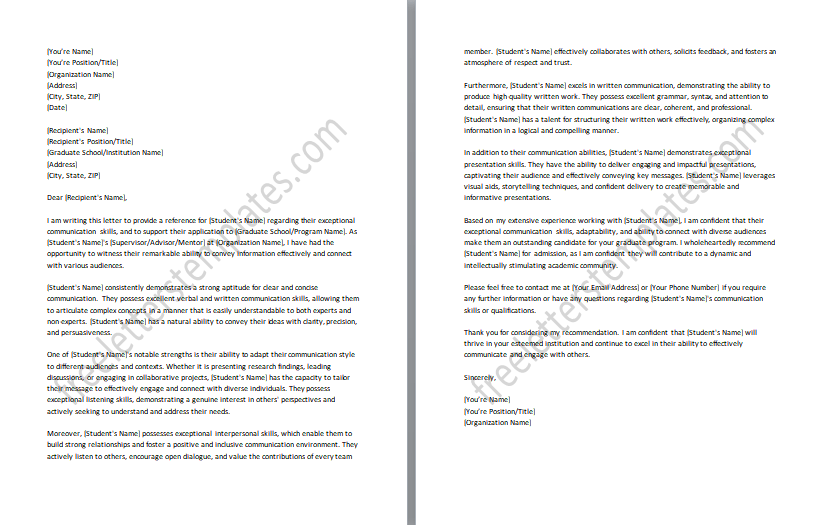
#13: Mentorship and Guiding Abilities
The purpose of this Mentorship and Guidance Reference Letter is to highlight the student’s exceptional ability to provide mentorship and guidance to others. This letter showcases their dedication to supporting and nurturing the growth of their peers or individuals they have mentored. It emphasizes their strong interpersonal skills, empathy, and ability to offer valuable advice and support to help others succeed. The Mentorship and Guidance Reference Letter serves as a strong endorsement of the student’s mentorship abilities and supports their application to graduate school or other opportunities where mentorship and guidance are valued.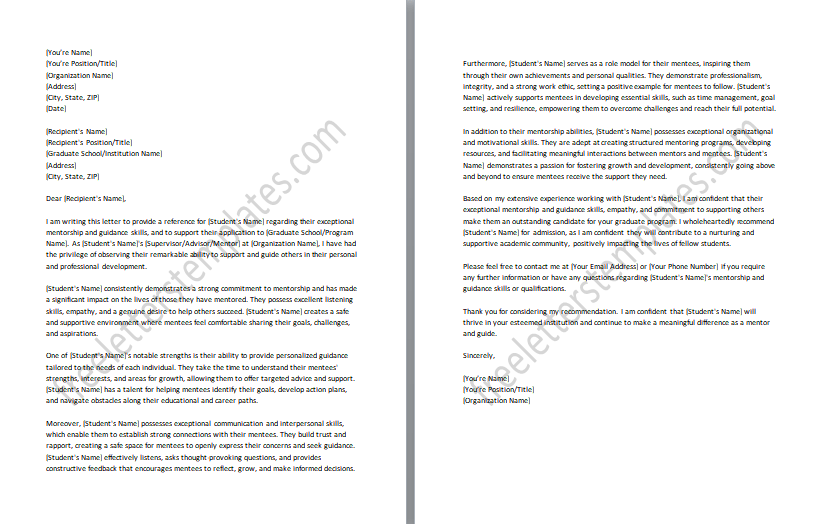
#14: Adaptability in Challenging Environments
The purpose of this Adaptability and Flexibility Reference Letter is to highlight the student’s exceptional ability to adapt to new situations and navigate through changing circumstances with ease. This letter showcases their flexibility in embracing new challenges, their ability to adjust their approach when faced with unexpected obstacles, and their openness to learning and growth. The Adaptability and Flexibility Reference Letter serves as a strong endorsement of the student’s adaptability and flexibility, supporting their application to graduate school or other opportunities where these qualities are highly valued.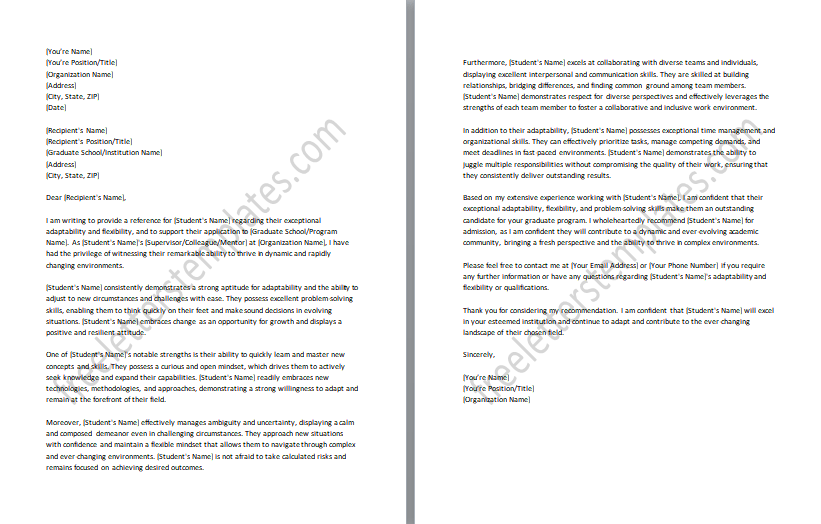
#15: Initiative and Proactive Attitude
The purpose of this Initiative and Proactivity Reference Letter is to highlight the student’s exceptional ability to take initiative and be proactive in their endeavors. This letter showcases their proactive mindset, their ability to identify opportunities and take action, and their drive to go above and beyond expectations. The Initiative and Proactivity Reference Letter serve as a strong endorsement of the student’s initiative and proactivity, supporting their application to graduate school or other opportunities where these qualities are highly valued.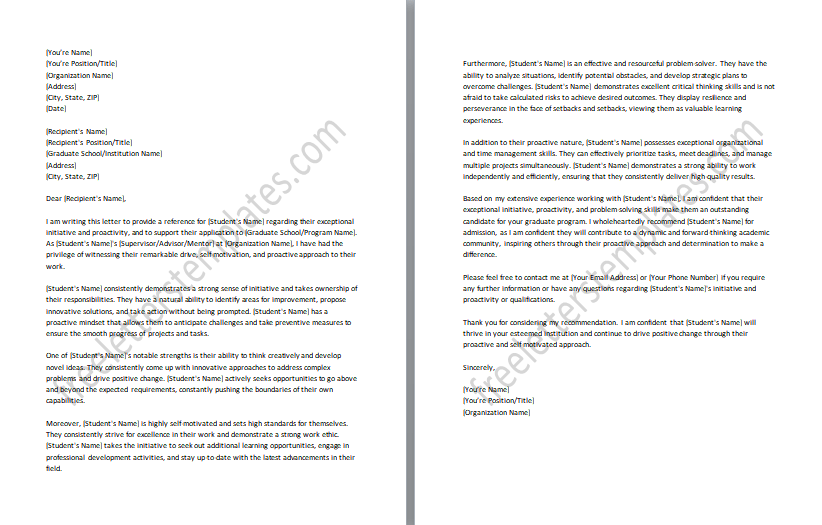
#16: Creative and Innovative Thinking
The purpose of this Creative Thinking Reference Letter is to highlight the student’s exceptional ability to think outside the box, generate innovative ideas, and approach challenges with a fresh perspective. This letter showcases their creative thinking skills, their capacity to explore unconventional solutions, and their ability to connect seemingly unrelated concepts. It emphasizes their imagination, curiosity, and willingness to take risks to achieve breakthrough outcomes. The Creative Thinking Reference Letter serves as a strong endorsement of the student’s creative thinking abilities and supports their application to graduate school or other opportunities where innovative and imaginative thinking is highly valued.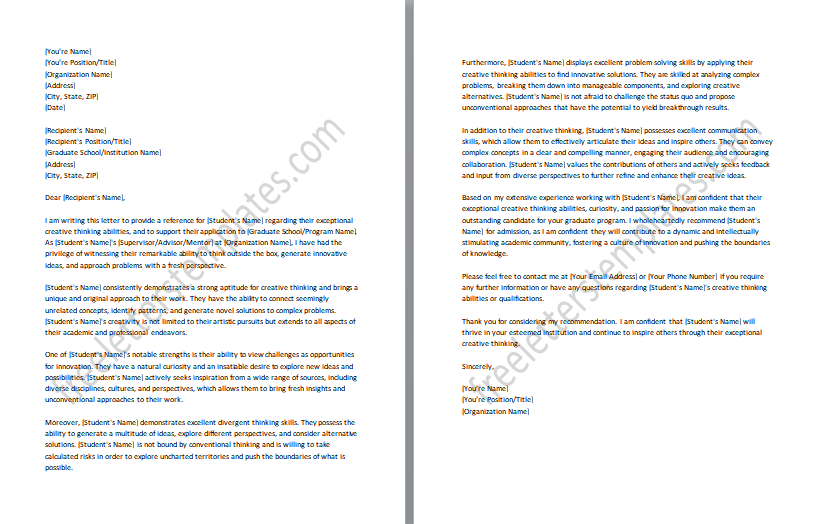
#17: Strong Analytical and Logical Reasoning
The purpose of this Critical Thinking and Analytical Abilities Reference Letter is to highlight the student’s exceptional ability to think critically, analyze complex information, and draw insightful conclusions. This letter showcases their strong analytical skills, their capacity to evaluate evidence objectively, and their ability to identify logical patterns and connections. The Critical Thinking and Analytical Abilities Reference Letter serves as a strong endorsement of the student’s critical thinking and analytical abilities, supporting their application to graduate school or other opportunities where these skills are highly valued.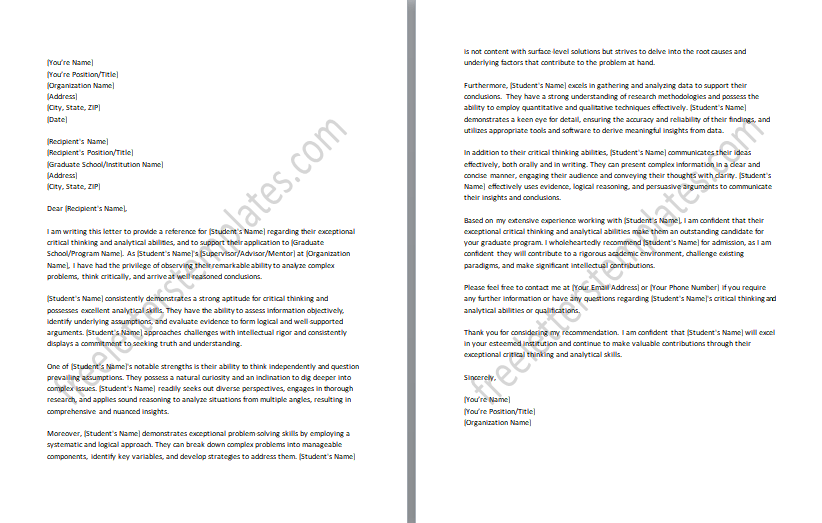
#18: Professional Growth and Development
The purpose of this Professional Development and Growth Reference Letter is to highlight the student’s exceptional commitment to continuous learning, personal growth, and professional development. It emphasizes their participation in workshops, training programs, or other professional development opportunities, as well as their willingness to seek feedback and act upon it. The Professional Development and Growth Reference Letter serves as a strong endorsement of the student’s commitment to lifelong learning and their potential for ongoing success in their chosen field. It supports their application to graduate school or other opportunities where continuous professional growth is valued.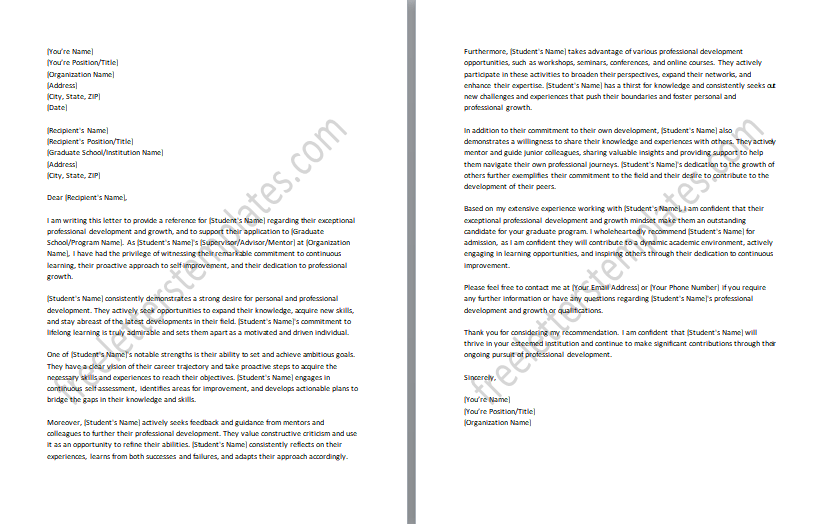
Customized Reference Letter Services
We understand that writing a strong and tailored reference letter for graduate school applications can be a challenging task. To assist individuals in presenting their qualifications effectively, we offer personalized reference letter writing services. Our experienced team of professional writers can help craft compelling reference letters that highlight your strengths, achievements, and potential for success in graduate studies.
Here’s how our customized reference letter services can benefit you:
- Expert Writers: Our team consists of skilled writers with extensive experience in writing reference letters for various academic disciplines. They are well-versed in the expectations and requirements of graduate school admissions committees, ensuring that your reference letter meets the highest standards.
- Tailored to Your Needs: We understand that each applicant is unique, and their reference letters should reflect their individual qualities. Our writers take the time to understand your background, experiences, and career goals. We then tailor the reference letter to align with your specific strengths and the requirements of your target graduate programs.
- Emphasizing Key Qualities: Our writers have a keen eye for identifying your key qualities and accomplishments that will make you stand out as a strong candidate. We focus on highlighting your academic achievements, research experiences, leadership abilities, and any other relevant strengths that will impress the admissions committee.
- Professional Language and Structure: We ensure that your reference letter maintains a professional tone and adheres to a clear and organized structure. Our writers use persuasive language to convey your qualifications effectively and make a compelling case for your admission to the graduate program.
- Confidentiality and Originality: We prioritize the confidentiality of your information and guarantee that all reference letters we provide are original and customized to your specific needs. You can trust us to maintain the privacy of your personal and academic details throughout the process.
- Timely Delivery: We understand the importance of meeting application deadlines. Our team works diligently to deliver your reference letter within the agreed-upon timeframe, allowing you ample time to review and submit your application promptly.
- Ongoing Support: Our services don’t end with the completion of your reference letter. We provide ongoing support and are available to address any questions or concerns you may have throughout the application process.
Dos and Don’ts of Reference Letters
Writing an effective reference letter requires careful consideration and adherence to certain guidelines. Here are some important dos and don’ts to keep in mind when crafting reference letters:
Dos:
- Do know the applicant well: Take the time to gather sufficient information about the applicant’s qualifications, achievements, and character. This will enable you to provide an accurate and comprehensive assessment.
- Do highlight relevant strengths: Focus on the applicant’s key strengths and qualities that are relevant to their graduate school application. Emphasize their academic achievements, research abilities, leadership skills, and other attributes that align with the program’s requirements.
- Do provide specific examples: Support your claims about the applicant’s qualifications with specific examples or anecdotes. Describe instances where you observed their skills, accomplishments, or contributions, making the letter more credible and compelling.
- Do use professional language: Maintain a professional and respectful tone throughout the letter. Use appropriate language and avoid using overly casual or informal expressions.
- Do tailor the letter to the program: Customize the reference letter to align with the specific requirements and focus of the graduate program. Highlight how the applicant’s skills, experiences, and goals resonate with what the program seeks in its candidates.
- Do proofread and edit: Carefully proofread the letter to ensure it is free from grammatical errors, typos, and inconsistencies. Edit the content for clarity, flow, and coherence. A well-polished letter reflects positively on both the applicant and the reference writer.
- Do maintain confidentiality: Respect the applicant’s privacy by ensuring the confidentiality of their personal and academic information. Share only relevant details that are necessary for the application process.
Don’ts:
- Don’t exaggerate or misrepresent: Avoid exaggerating the applicant’s qualifications or misrepresenting their abilities. Be honest and provide an objective assessment of their strengths and accomplishments.
- Don’t use generic or clichéd language: Steer clear of generic or clichéd phrases that do not add value to the reference letter. Instead, provide specific and meaningful insights about the applicant.
- Don’t include irrelevant information: Stick to the relevant aspects of the applicant’s qualifications and experiences. Avoid including unrelated details that may distract from the main focus of the letter.
- Don’t rely solely on the applicant’s self-assessment: While it’s important to consider the applicant’s self-assessment, rely on your own observations and interactions with them to provide an objective evaluation. Assess the applicant’s abilities based on your own expertise and perspective.
- Don’t rush the process: Take the time needed to write a thoughtful and well-crafted reference letter. Rushing through the process may lead to errors or overlook important details that could strengthen the applicant’s candidacy.
- Don’t include personal biases: Ensure that your reference letter is free from any personal biases or prejudices. Evaluate the applicant objectively based on their merits and qualifications.
Concluding Thoughts
We understand the crucial role that references letters play in the graduate school application process. Our mission is to provide exceptional reference letter services that empower individuals to present their qualifications, achievements, and potential in the best possible light. Our team of experienced professionals is committed to delivering high-quality, tailored reference letters that align with your goals and the requirements of your desired graduate programs. With our expertise and dedication, we aim to increase your chances of securing admission to the graduate school of your dreams. Trust us to help you make a compelling case for your candidacy and embark on an exciting academic journey. Contact us today to explore how we can assist you in creating impactful reference letters for your graduate school applications.